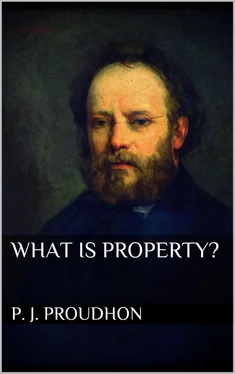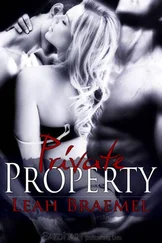Certainly, the preservation of property,—
"Rest on the right of property." 14
Corner-stone of all which is, stumbling-block of all which ought to be,—such is property.
To sum up and conclude:—
Not only does occupation lead to equality, it PREVENTS property. For, since every man, from the fact of his existence, has the right of occupation, and, in order to live, must have material for cultivation on which he may labor; and since, on the other hand, the number of occupants varies continually with the births and deaths,—it follows that the quantity of material which each laborer may claim varies with the number of occupants; consequently, that occupation is always subordinate to population. Finally, that, inasmuch as possession, in right, can never remain fixed, it is impossible, in fact, that it can ever become property.
Every occupant is, then, necessarily a possessor or usufructuary,—a function which excludes proprietorship. Now, this is the right of the usufructuary: he is responsible for the thing entrusted to him; he must use it in conformity with general utility, with a view to its preservation and development; he has no power to transform it, to diminish it, or to change its nature; he cannot so divide the usufruct that another shall perform the labor while he receives the product. In a word, the usufructuary is under the supervision of society, submitted to the condition of labor and the law of equality.
Thus is annihilated the Roman definition of property—THE RIGHT OF USE AND ABUSE—an immorality born of violence, the most monstrous pretension that the civil laws ever sanctioned. Man receives his usufruct from the hands of society, which alone is the permanent possessor. The individual passes away, society is deathless.
What a profound disgust fills my soul while discussing such simple truths! Do we doubt these things to-day? Will it be necessary to again take arms for their triumph? And can force, in default of reason, alone introduce them into our laws?
ALL HAVE AN EQUAL RIGHT OF OCCUPANCY.
THE AMOUNT OCCUPIED BEING MEASURED, NOT BY THE WILL, BUT BY THE VARIABLE CONDITIONS OF SPACE AND NUMBER, PROPERTY CANNOT EXIST.
This no code has ever expressed; this no constitution can admit! These are axioms which the civil law and the law of nations deny!.....
But I hear the exclamations of the partisans of another system: "Labor, labor! that is the basis of property!"
Reader, do not be deceived. This new basis of property is worse than the first, and I shall soon have to ask your pardon for having demonstrated things clearer, and refuted pretensions more unjust, than any which we have yet considered.
Конец ознакомительного фрагмента.
Текст предоставлен ООО «ЛитРес».
Прочитайте эту книгу целиком, купив полную легальную версию на ЛитРес.
Безопасно оплатить книгу можно банковской картой Visa, MasterCard, Maestro, со счета мобильного телефона, с платежного терминала, в салоне МТС или Связной, через PayPal, WebMoney, Яндекс.Деньги, QIWI Кошелек, бонусными картами или другим удобным Вам способом.












